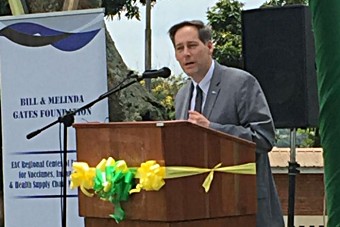
Gavi's Alan Brooks speaks at the launch of the new Centre of Excellence
Credit: Gavi/2016
Why do immunisation supply chains need modernising?
A: Most countries’ immunisation supply chains were designed over 40 years ago when the Expanded Program for Immunization (EPI) was set up. By finding a way to move temperature-sensitive vaccines to the most remote parts of the world, the existing infrastructure has served us well. But now health commodity supply chains, especially in Africa, are stretched to maximum capacity under an ever-greater number of vaccines, medicines and health products.
Addressing these challenges through fragmented, ad-hoc measures, such as buying more refrigerators, is no longer appropriate. We need more fundamental measures to update supply chains for the next 10, 20 or even 40 years so children, parents, and communities can be reached with life-saving treatments and preventive medicines – wherever they live.
How will the Centre of Excellence help?
A: While amazing advances in technology, communication and infrastructure drive the modernisation of supply chains, the system relies on strong managers. Developing dedicated and competent leaders and skilled, motivated and empowered personnel at all levels of the health system is critical.
The Centre of Excellence will help train professionals across East Africa, teaching best practices for solving health supply chain challenges. With the support of the East African Community and a variety of development partners, we expect the Centre to become a regional hub for both education and innovation.
What has been Gavi‘s role in getting the Centre off the ground?
A: Together with other partners, we are proud to have helped jump-start the Centre. Our support has enabled the Centre to finalise its training strategy, building upon the experience of the LOGIVAC Center in West Africa, providing IT materials and preparing trainers. We have also helped bring innovation and experience from the private sector to support the University.
Why is the private sector so critical to the success of this venture?
A: To achieve our ambitious goal of fully immunising every child with life-saving vaccines, we are constantly looking for innovative approaches to tackle long-standing barriers to immunisation. As a public-private partnership, Gavi has long recognised that the private sector can bring new thinking and new approaches.
Both UPS and the International Federation of Pharmaceutical Wholesalers (IFPW) are great examples of organisations that bring much needed private sector skills and knowledge to help modernise immunisation supply chains.
- Working hand in hand with the University of Rwanda, UPS has helped design and establish an executive training and mentorship course. This teaches supply chain managers how to build and run high-performing teams.
- IFPW, an industry association which represents over 30 companies from around the world including GlaxoSmithKline, Imperial Health Sciences and AmerisourceBergen, has committed to provide US$ 1 million in funds and technical expertise to the Centre. This will support seven Masters’ level scholarships and provide the quality of staff needed to help the Centre achieve its vision.
In addition to the Centre for Excellence, what else is Gavi doing to help countries strengthen their supply chains?
A: Gavi has put in place a multi-year strategy to improve supply chains based on five fundamentals: strong leadership, more reliable data, up-to-date equipment, better design and the use of continuous improvement processes.
How important are supply chain managers to sustainable development?
A: Supply chain managers are a critical component of sustainable development. They give confidence to governments, communities and development partners by ensuring that investments are well cared for.
Gavi provides approximately US$ 1.5 billion per year in vaccines to countries, including to all of the East African Community. It is a shared risk. Over the next five years, we estimate that countries themselves will also invest around US$ 200 million per year in vaccine – a far cry from 15 years ago when virtually all vaccine costs were covered by development partners.
Today, we have a shared need to assure all our investments contribute to the health of children and adolescents across the East African Community.
